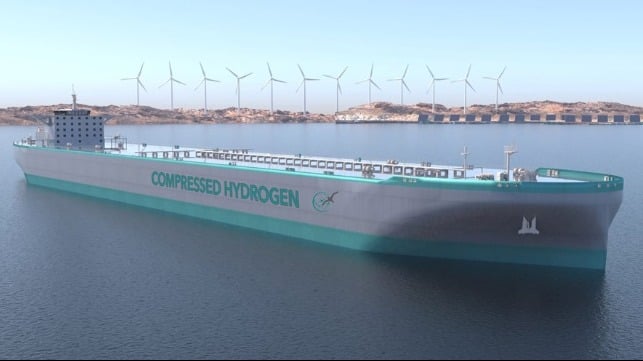Hydrogen Fuel Cells for Ocean-Going Ships and Inland Waterways

Hydrogen fuel cells continue to be viewed as one of the most promising technologies to meet the maritime industry’s goals to reduce and eliminate greenhouse gas emissions. A broad range of companies are all working to develop the technology with two additional programs joining the efforts to use the technology in the propulsion of an increasing range of shipping.
The Australian-based Global Energy Ventures announced it is entering into a two-year project with Ballard Power Systems to design and develop a hydrogen fuel cell system for the company’s proposed large-scale ocean-going hydrogen transport ship. The Compressed H2 Ship (C-H2) is a concept design to transport up to 2,000 tons of compressed hydrogen at 250 bar. GEV projects that the C-H2 ship at scale will have a power requirement of 26MW. The company is also developing a design for a smaller pilot ship that would have a power requirement of under 10MW.
Ballard will be responsible for the design of the fuel cell system utilizing its hydrogen fuel cell technologies. They will also assist GEV with the integration of the system into the design of the C-H2 ship.
GEV’s goal is to leverage the advancements in fuel cells and hydrogen internal combustion engines to create the vessel that provides for the large-scale transport of hydrogen. The company is also working with the American Bureau of Shipping and Capilano Maritime with the goal to receive Approval in Principle (AIP) for the design in the first half of 2021.

that matters most
Get the latest maritime news delivered to your inbox daily.
While the Australian project is focused on a large, ocean-going vessel, Norway’s TECO 2030 is pursuing the development of zero-emission hydrogen-based fuel cell propulsion for river going vessels, such as push tugs, dredgers, passenger and cargo ships, and low-profile coasters.
TECO 2030 announced that it has signed a strategic cooperation agreement with the Dutch Thecla Bodewes Shipyard to develop expertise and competence for the construction of low and zero-emission vessels. The companies view this as a platform for potential joint projects to develop efficient and safe hydrogen fuel cell river vessels, including manufacturing, installation, testing, and common marketing. Their goal is to commercialize the technology for inland waterway transport.
